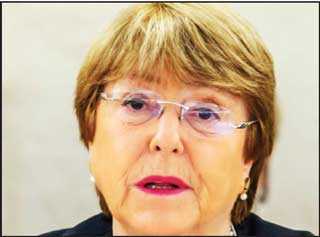Sunday Feb 15, 2026
Sunday Feb 15, 2026
Thursday, 25 March 2021 00:12 - - {{hitsCtrl.values.hits}}
 |
| UN Human Rights Chief Michelle Bachelet
|
UN Human Rights Chief Michelle Bachelet has expressed hope that Sri Lanka would “change course” from current policies as she welcomed the decision of the Human Rights Council to ramp up monitoring of human rights and war-time abuses in the island.
On Tuesday, 22 member states of the UN Human Rights Council (UNHRC) voted to adopt Resolution 46/1 to promote reconciliation, accountability and human rights in Sri Lanka and expand UN oversight on the country’s rights record and justice failures.
Speaking to the BBC on Tuesday (23) after a vote on the Sri Lanka resolution at the Council, High Commissioner for Human Rights Bachelet said the UNHRC had decided to pursue accountability for past crimes.
“I salute the courage and commitment of victims from all communities in Sri Lanka in their pursuit of truth and justice,” the former Chilean President, a torture survivor herself, told the BBC in an interview. Bachelet said she hoped that the Government of Sri Lanka would change course and “ensure full protection of minorities, human rights defenders and the media”.
The UNHRC resolution on Sri Lanka empowered Bachelet’s office to collect, preserve and analyse evidence of war crimes and related human rights violations with a view to future prosecutions against perpetrators. The Resolution called for the establishment of a mechanism led by the OHCHR, which will comprise at least 12 staffers, including investigators, lawyers, and victim support officers.
To design strategies for future prosecutions in line with the UNHRC resolution adopted on Tuesday, Daily FT learns that the team from Bachelet’s Office could study evidence gaps, identify command structures, and analyse documents and satellite imagery, creating a central, independent repository of evidence on human rights crimes in Sri Lanka, during the civil war and beyond.
Should trials ever commence against Sri Lankan perpetrators in foreign countries, the OHCHR database, once established, could feed UN certified, independent evidence into those proceedings.
Bachelet’s stinging 17-page assessment of the human rights situation in Sri Lanka was a clarion call to UNHRC member states, and a catalyst for a resolution that started off as a weak draft, that grew increasingly more stringent as the 46th Session of the Council wore on.
The UN Rights Chief pointed to early warning signs of an impending human rights disaster in Sri Lanka, as she highlighted rampant militarisation, obstruction of justice for past atrocities, the jailing and persecution of investigators who pursued emblematic cases and the increased surveillance and intimidation of rights activists and journalists.
